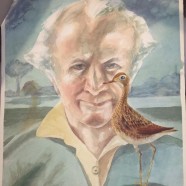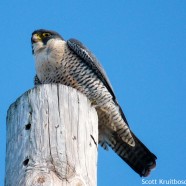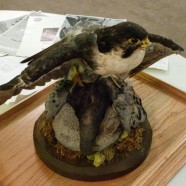Spring Migration Time!
Spring is finally here and new birds are arriving each day. One species that has already returned from their wintering grounds is the Osprey. They rejoin us each March after a very long journey as their winter quarters can be as far away as southern sections of South America. Audubon volunteers from the Menunkatuck Audubon Society have been hard at work for many years to ensure that their homes are sound and waiting for them when they arrive. The return of the Osprey highlights one of the great conservation success stories of the late 20th and early 21st centuries. In the 1940’s there...
Read MoreBanded Peregrine Falcon Devouring Pigeon
One of the most outrageously spectacular and breath-taking winter bird sightings you can have is, in my opinion, the Peregrine Falcon. As the fastest animal on the Earth the Peregrine is already in a class of its own, and if you have never seen one stooping on shorebirds, waterfowl or other coastal and open-country birds you are missing out on one of the most unbelievable happenings on the planet. The raw power and sheer speed these birds display is literally unmatched. After recovering from decimation via DDT the Peregrine Falcon has begun to reconquer our landscape, moving into cities and...
Read MoreDEC’s Connie Adams on Peregrines
Last month New York State Department of Environmental Conservation Senior Wildlife Biologist Connie Adams came to speak at the Roger Tory Peterson Institute Ornithological Club meeting. Connie’s talk was on the fastest creature on the planet, the Peregrine Falcon, and their history, biology and status in New York. Instead of her typical presentation Connie brought along a couple friends to help her out. These mounts are of a male and female Peregrine Falcon that were actually a mated pair in Buffalo. Can you tell which of the birds is which? Male raptors are typically smaller than...
Read More






